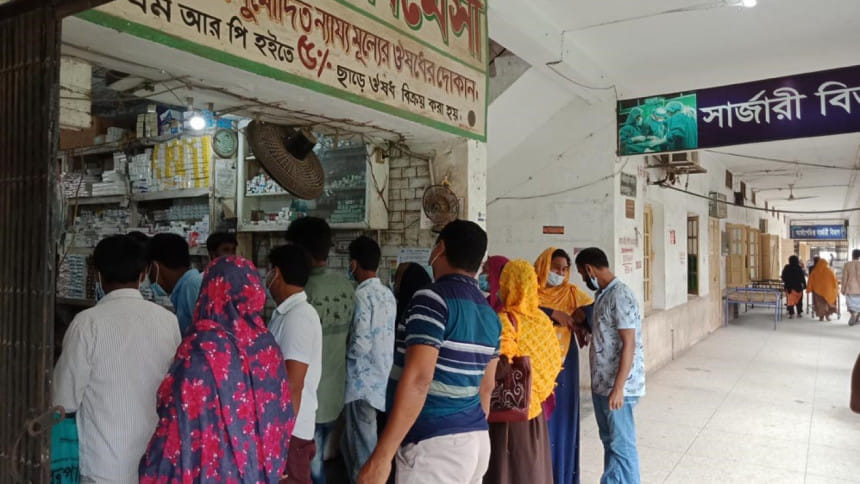We can't allow healthcare costs to spin out of control

While teaching at the University of Chittagong from 2003-2009, I came to learn that the Teachers' Association would intermittently dock one day's salary from all teachers to help support medical treatment for colleagues, when requested. It felt counterintuitive given that one of the most dignified professional classes will ask for goodwill from fellow compatriots to pay their medical bills. This also loudly tells what the common people experience when it comes to healthcare. Many citizens go penniless to pay medical expenses, while others choose to go without care. The state of affairs in healthcare is in shambles.
According to a report in The Daily Star, from 1997-2020, out-of-pocket costs for medical expenses in Bangladesh increased from 55 percent to 68.5 percent, the highest among Saarc nations. The report is supported by the fact that appropriation for healthcare in Bangladesh gets a perplexing 2.63 percent of the national budget, while the US allocates roughly 13 percent of its national budget in this area.
Arguably, it is beyond the government's capacity to provide medical care to over 170 million people for free – an idea floated around the demand for universal healthcare in the country. However, there are innovative solutions. Promoting commercial and private healthcare insurance, driven by competition, can drive down healthcare costs while expanding healthcare to countless people.
Admittedly, the first barrier to promoting health insurance coverage is a lack of trust and transparency – the two key pillars of affordable healthcare. The rampant corruption, favouritism, and nepotism in the health industry feel insurmountable. We must wipe out dishonesty and ill-intentioned businesses which are geared towards profits. The state of the insurance market, which contributes only 0.46 percent to the country's GDP, tells us that the existing insurance culture is not functioning. Consumers' trust in insurance companies has eroded as subscribers' claims remain unsettled extendedly or they are simply lied to when it comes to receiving critical assistance in times of need.
The government must implement existing laws to strengthen the regulatory framework and eliminate the influence of political and social clouts in healthcare, be it in the hospital or the insurance sector. New laws will be just as fruitless without enforcement. The authority must build a comprehensive legal framework to introduce and support health insurance companies to operate on a competitive basis. Competition reduces healthcare costs and improves the quality of care as it promotes consumers' power to decide which company can best serve their medical needs.
Insurance companies must develop their policies and coverage simply and lucidly. In the US, health plans must write their benefits statements easily enough that even average eighth graders can understand them. A simplified policy will reduce chances of duplicity by insurers.
Insurance companies must also build a network of providers based on bargains and transparency to bring the best care to patients at a competitive price. The providers will embrace competition to penetrate the market and offer a wide range of services at lower prices. The plan-to-plan and provider-to-provider competition drives the healthcare industry for positive patient outcomes. This leads to a patient-centred ecosystem, giving the patient the ultimate power to choose.
The government must build parallel insurance plans for low-income individuals and families to drive competition even further. These plans will help the needy, which is a significant segment of the population. Commercial and private insurers will vie to get government contracts for health services. In the US, the federal government sponsors 34 percent of total health spending while households spend 27 percent.
Ideally, almost the entire population should be served under all these distinct health plans funded by the government and the public.
Competition will bring hospitals to the transparency we so crave to see in our healthcare sector. The government must require hospitals to publish their quality reports including charges, fees, services, and customer satisfaction on their websites. In practice, government-provided quality scores of providers are key to helping consumers decide their healthcare choices. Every provider must inform patients what the cost of the service would be even before treatment starts.
Because of transparency and competition, the low-performing facilities will go out of business while the better providers will gain more market share. The collective role of plans, providers, and the public can build a health sector where most people can afford the care, as OOP costs will be reduced and resources equitably allocated.
ABM Uddin is a healthcare consultant at the Florida Agency for Health Care Administration. Views expressed in this article are the author's own.

 For all latest news, follow The Daily Star's Google News channel.
For all latest news, follow The Daily Star's Google News channel. 












Comments